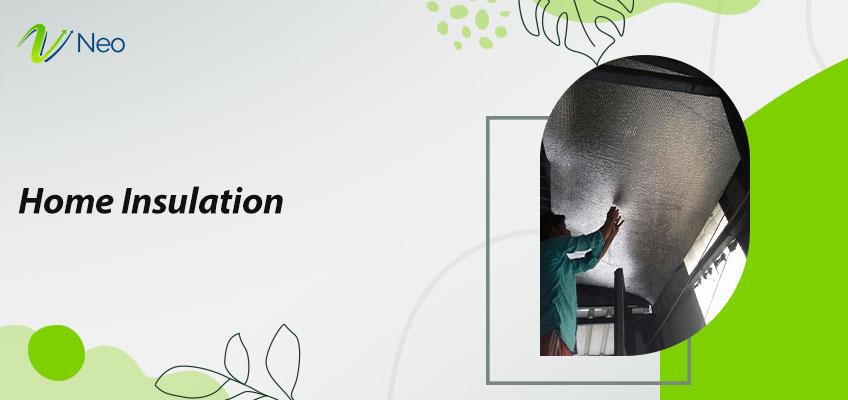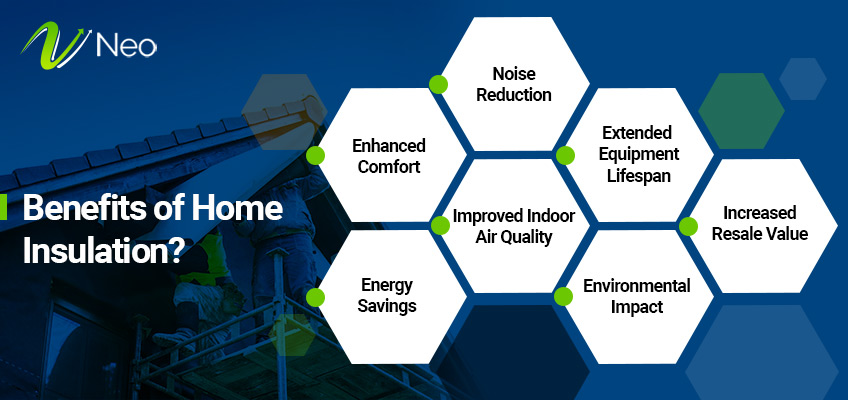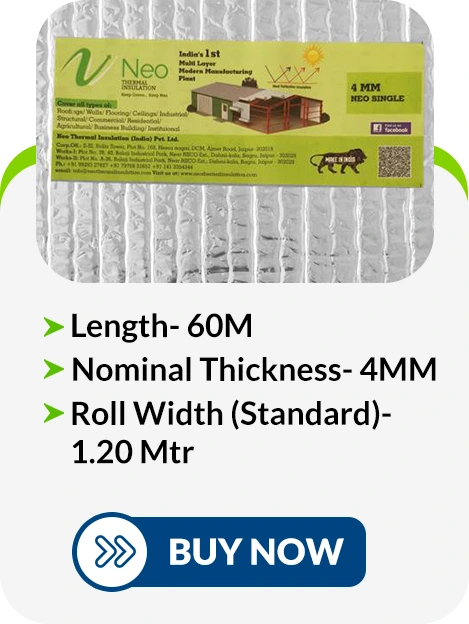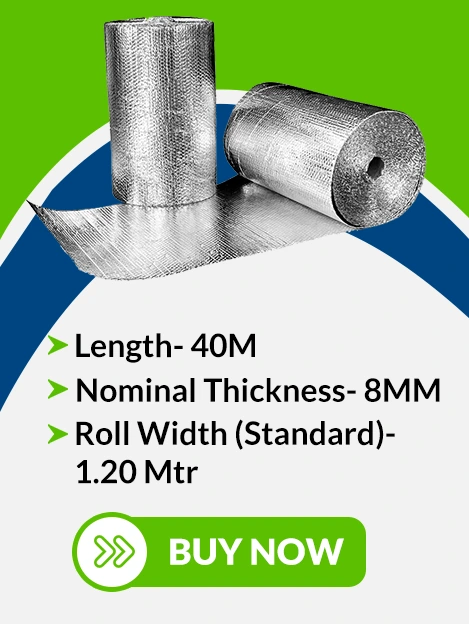Home Insulation: Types, Benefits and Insulation Areas
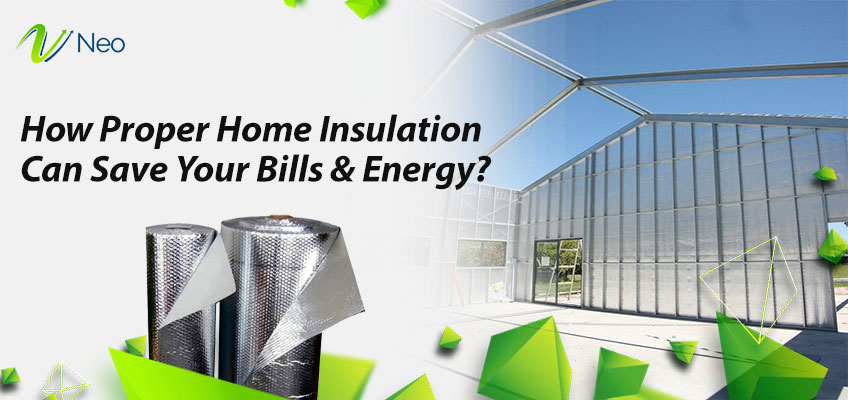
The importance of proper home insulation lies in ensuring that every home has it, as it is a key aspect of energy efficiency and cost-effectiveness. Poorly insulated homes result in heat escaping during winter and seeping in during summer, causing heating and cooling systems to work overtime. This leads to high energy bills and increased carbon dioxide emissions. However, effective insulation provides a thermal barrier that keeps indoor temperatures stable and minimizes the load on HVAC equipment. It reduces expenses by preventing heat exchange and saving a significant amount of energy required to maintain favorable climatic conditions inside your house, thus limiting the ecological impact.
Whether you’re constructing a new house or retrofitting insulation into your existing home, you’re in the right place. In this blog, we will explore how appropriate home insulation can help you reduce your bills and energy consumption.
What is Home Insulation?
When speaking of home insulation, it means materials and methods by which a thermal barrier is created inside of a house’s walls, roof, floors, etc. The main objective of home thermal insulation is limiting the amount of heat transferred inside versus outside of a structure. Insulating materials work by blocking out any kind of heat flow within the building to keep temperatures at a more even level.
Examples of common insulating materials are; fiberglass, foam boards, cellulose, and spray foam. These heat insulation materials are set up on walls, roofs, and floors with a view preventing heat transfer thereby maintaining houses warm in winter and cool in the summer period. Insulation is effective by improving comfort, which is vital for energy efficiency as well. This minimizes unnecessary heating and cooling hence low electricity bills and reduced damage to the environment. Listed the majority of people who participate in informal games are uninhibited by rules or any other restraints. House Insulation should be properly designed and installed as well as regularly checked to sustain a comfortable and efficient environment in your dwelling place.
How Does Home Insulation Work?
Insulation aims to stop the transmission of heat between the inside and outside of a construction. This principle is based on a fundamental notion of reducing heat transmission rate. Therefore heat naturally finds its way from warmer places towards the cooler. During the winter season, the insulation keeps heat within a home, and in summer, it stops unwanted heat from flowing in.
This is a result of low thermal conductivity in some home insulation material. This results in pockets of air that are trapped within the structure of each fibre, acting like an insulator. For instance, there is a good example of fibreglass insulation made of silicate glass and consisting of tiny fibres, which hold well-trapping air, and thus act as a thermal barrier. Heat also flows through other material such as foam boards which uses its cellular structure.
The effectiveness of insulation depends on several factors, which include the thickness and types of insulation. The higher the thickness/density of insulation the greater its ability to resist heat transfer/conduction. Installed well in walls, ceilings, and floors, insulation promotes consistency of inside temperature thereby minimizing the extra requirement of heating or cooling which results in saving on energy and feeling comforted at home.
Get Home Insulation Installation Now To Save Bills And Enjoy Comfort!
What are the Benefits of Home Insulation?
By upgrading your Thermal insulation, you can enjoy its benefits year-round and throughout your lifetime. Here are some key advantages:
1. Energy Savings
The home insulation is like a thermal barrier with reduced heat transfer in and beyond the house. Insulation keeps your home warm during winter, and cool in summer thus significantly reducing load on your heating & cooling systems. To elaborate further, it will consume a lesser amount of energy to sustain a given temperature and with this saving, you will be able to realize reduced energy consumption bills on a long-term basis as far as this is concerned.
2. Enhanced Comfort
Effective insulation helps to maintain stable indoor temperatures regardless of external conditions. In winter, you will not experience cold gusts and in summer, you will not suffer from high temperatures. Such consistency in temperate helps make the living environment comfortable around the year to the pleasure of you and your friends and relatives.
3. Noise Reduction
Using certain house insulation material, especially those that have some damping abilities for sound, you can limit the amount of noise from outside entering your house or business premises. It translates to fewer cases of car noise, barking dogs, and other disruptions coming from the outside leading to less intrusive noise getting in or sound transfer between two spaces reducing the amount of background noise within the home.
4. Improved Indoor Air Quality
There is more than one reason why house insulation is vital for controlling room temperatures. For instance, insulation prevents draughts, dust, allergens, and outdoor pollutants from entering a room or house. As such, this creates cleaner indoor air which minimizes the cases of respiratory problems and allergies within your house, thus ensuring good health and welfare for your home.
5. Environmental Impact
This results in insulated houses that use less energy for heating and cooling, resulting in a reduced carbon emission level. Reduced use of energy helps reduce emissions of greenhouse gases promoting environmental sustainability and combating global warming.
6. Extended Equipment Lifespan
The insulation will also help reduce your HVAC system’s workload. Insulation of a building reduces the need for systems to be operational all the time, thereby extending their lifespan. This also helps in cutting down on maintenance costs, repair jobs, and replacing your HVAC machines early.
7. Increased Resale Value
Most people value well-insulated homes and usually have options for them. Compared to conventional technologies people perceive them as more energy-efficient, cost-effective, and comfortable. Therefore, this helps make your property more desirable among buyers in the real estate business and therefore increases its resale value thereby making it an ideal investment for the future.
8. Long-Term Savings
There may be an initial investment in home insulation but the long-term savings on energy bills can outweigh the costs. Insulation helps maintain a consistent indoor temperature, reducing the need for excessive heating or cooling throughout the year.
Types of Insulations Material Used in home
When it comes to insulating your home, there are several insulation materials to consider, each with its own benefits and drawbacks. Here are six common types of home insulation material:
Fiberglass Insulation
This insulation material is made from fine glass fibers and is one of the most popular choices due to its affordability and effectiveness. It’s typically found in rolls or batts and is known for its excellent thermal performance and soundproofing qualities.
Foam Board Insulation
This consists of rigid panels that provide high insulating value with minimal thickness. It’s great for insulating foundation walls, basement walls, and certain types of roofs. Foam boards are resistant to moisture and are easy to install.
Insulation Sheets
Insulation sheets are large, flat pieces of insulation material that can be cut to fit various spaces. They come in different materials, such as air bubble sheets, aluminum and provide a continuous layer of insulation. These sheets are ideal for insulating walls, roofs, and floors.
Spray Foam Insulation
Spray Foam Insulation is a versatile option that can be sprayed into walls, ceilings, and floors. It expands to fill gaps and cracks, providing an airtight seal. This type of insulation is highly effective at reducing air leakage and improving energy efficiency.
Cellulose Insulation
Made from recycled paper products, Cellulose Insulation is an eco-friendly choice. It’s treated with fire retardants to improve safety and is often blown into attics and wall cavities. Cellulose insulation provides good coverage and is effective at reducing airflow.
Mineral Wool Insulation
Also known as rock wool or slag wool, mineral wool insulation is made from molten rock or industrial waste products. It offers excellent fire resistance and soundproofing properties. Mineral wool is available in loose-fill or batts and is often used in areas requiring high-temperature insulation.
If you want to know in each type of insulation check out this detailed article: Types of Insulation.
How to Choose the Type of Insulation For Your Home?
It’s crucial to bear in mind that the effectiveness of your home insulation hinges on two main factors: how well it’s installed and how well-suited it is to your specific location and climate. Therefore, as we delve into the various insulation types, let’s keep these three critical considerations in focus:
1. Which Part of Your Home Needs Insulation?
Different insulation types are tailored to different areas of your home. For instance, if you’re insulating a new wall, blanket batts or rolls (discussed below) are great options. However, if you’re insulating a roof or ceiling, thermal insulation sheets are the best options.
2. What’s the Ideal R-Value for Your Region?
The R-value of insulation indicates its resistance to conductive heat flow. The higher the R-value, the more effective the insulation. Keep in mind that recommended R-values can vary depending on your specific climate and location.
3. What’s Your Budget?
When considering insulation, your budget plays a significant role. Insulating a substantial portion of your home can lead to significant cost differences between insulation types. While cost is a factor, remember that most insulation pays for itself over time through energy savings on heating and cooling bills. Additionally, some pricier insulation options offer health benefits that make them worthwhile investments.
Other factors to take into account include the insulation material’s longevity, ease of installation, the percentage of recycled content, and its impact on indoor air quality. Fire safety is another crucial factor; certain insulation types are more fire-resistant than others, and we’ll discuss this aspect in detail for each type.
Places you can Install Insulation in Your Home!
The right method of installation of insulation inside a home ensures a sufficient amount of comfort and energy efficacy. Here are key areas to install insulation:
Attic
One of the best ways to improve efficiency in your attic is by insulation. In the winter, it prevents heat from escaping while in summer, it prevents heat from entering. Option for such materials as fibreglass batts, blown-in cellulose, or foamed board insulation./
Walls
The outer walls are insulated to ensure that indoor temperatures remain constant. The walls of houses can be insulated by inserting home insulation walls in wall cavities or fitting rigid foam boards.
Basement and Crawlspaces
These areas are insulated so that the floors above remain warmer. In such areas, you can use foam board or spray foam insulation.
Floors
An example of this is insulating floors above unheated spaces like garages and crawlspaces to preserve heat. Employ ‘batt’ or ‘foam board’ insulation.
Doors and Windows
Sealing gaps and adding weather strips on doors and windows although this cannot be termed a traditional type of insulation is crucial to avoid drafts.
Pipes and Ducts
This is due to reduced energy loss from insulated pipes and HVAC ducts that maintain hot water temperature.
Roof
Insulate your roof if you have a flat or low sloppy one and you will save on energy costs. More so, it would assist you in improving your savings and energy use.
Read Also: Ultimate Guide to Metal Roof Insulation: Benefits, Types, and Uses
Insulation should be installed properly in these locations because it leads to great energy savings as well as enhancement of comfort at homes.
Tips to Consider During Home Insulation
- Prioritize insulating key areas in your home first, such as the attic, outer walls, and crawl space, as these are the primary areas of heat transfer.
- To curb energy loss and save on costs, insulate your water heater. Seek out pre-cut jackets or blankets with an insulating value of at least R-8. Adding insulation to your water heater can slash standby heat losses by 25 to 45 percent, resulting in savings of approximately 4 to 9 percent on water heating expenses.
- Prevent freezing and maintain hot water by wrapping your hot water pipes with tubular insulation. Opt for high-quality pipe insulation wrap. Insulating hot water pipes minimizes heat loss and can elevate water temperature by 2 to 4 degrees Fahrenheit compared to non-insulated pipes, allowing you to use a lower temperature setting.
- Enhance efficiency and reduce noise by insulating heating and air conditioning vent ducts. Properly insulating air ducts situated in unconditioned areas, such as attics, crawl spaces, garages, or unfinished basements, can significantly boost your home’s energy efficiency.
Why Choose Neo Thermal For Your House Insulation?
There are an ample number of reasons that make Neo Thermal Insulation an excellent choice when selecting your home insulation solutions provider. Its staff consists of experienced specialists who have worked in this sphere for many years. Through their expertise, they offer efficient installations, optimizing the gains of insulation. They specialize in enhancing the energy efficiency of your home, with a particular focus on providing solutions that minimize thermal bridging, thus optimizing your monthly utility costs.
Schedule Your Home Insulation Installation Today!
They know that each house has its specific features and they provide individual insulation options either for attics, walls, or any other parts, thereby enhancing efficiency. They employ top-quality wall insulator materials reputed for toughness and efficiency thereby guaranteeing you a lasting solution and profits within a short period.
Also, this home insulation contractor understands that they have an impact on the environment and therefore may offer energy-efficient options that will lessen your carbon footprint and make our Earth green. If you select Neo Thermal as your insulation installer, you can be assured of professionalism and dependability all through the way, from start to finish, without any problem or delay. Neo Thermal is an ideal option that will save you money on energy costs while providing optimum comfort.
Conclusion
There is no doubt that effective home insulation saves you money and power. A properly insulated home becomes a great barrier in blocking heat transfer toward a constant and bearable house temperature indoors. Insulation during the winter limits the loss of heat while keeping out much of the summer’s unwanted infiltration, which eases up the HVAC’s job a lot. As a result, the company will realize actual energy savings and reduced electricity bills.
In addition, the practice of insulation supports both financial and ecological stability. Lower energy expenditure implies lower levels of carbon emissions, making your house environmentally friendly. This translates to more comfortable environments, enhanced indoor air purity that minimizes allergies, and improved durability of your HVAC equipment.
The importance of proper home insulation in a world focused on conserving energy and operating efficiently cannot be overstated. This is an attempt at making your dwelling more eco-friendly and friendly to your pocket, thus improving your lifestyle for sure.
Frequently Asked Questions
1. What is the Best Home Insulation?
The best insulation for your home depends on various factors such as your climate, budget, and the specific area you want to insulate. However, if you’re looking for an overall good option, insulation sheets are highly recommended. They are versatile and come in various types to suit different needs.
2. What Is Home Insulation?
Home insulation refers to the utilization of different elements of technology to develop a heat shield inside a homestead. Specifically, it is designed to regulate heating between inside and outside, ensuring constant air conditions within the building.
3. Where Is House Insulation Most Important?
House insulation is most important in areas subjected to high-temperature fluctuations like the attic, wall, and roof. These are among of the areas where proper insulation can result in great energy efficiency and comfort.
4. How Can Home Insulation Save Your Bills?
Home insulation reduces heat transfer hence, avoids heat loss during winter while preventing the entry of heat, which happens during summer. As a result, there is less dependence on thermal units causing a decrease in utilities and bills.
5. What Part Of The House Is Best To Insulate?
The attic is often considered one of the best areas where insulation could make a major difference in terms of making living spaces energy efficient. Also important in achieving overall insulation is insulating walls, floor over an unheated space, and sealing gaps around doors or windows.
